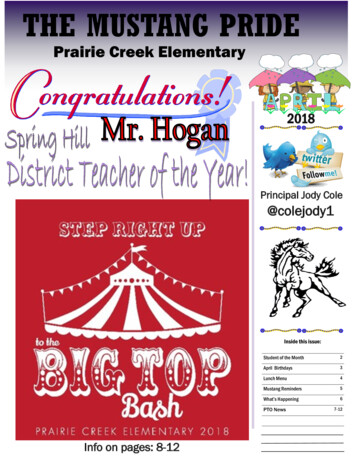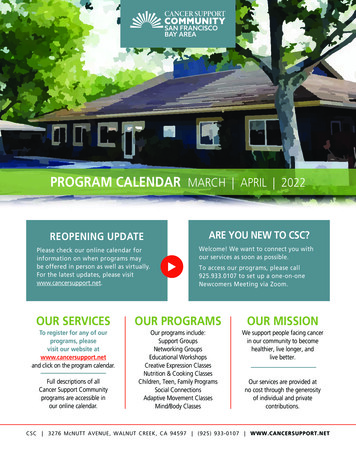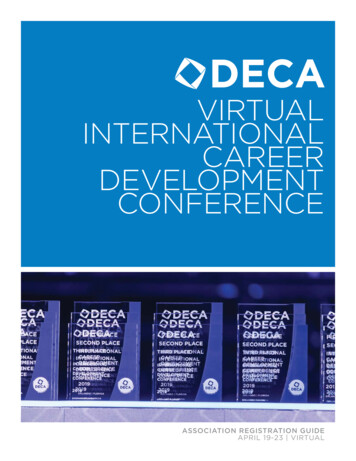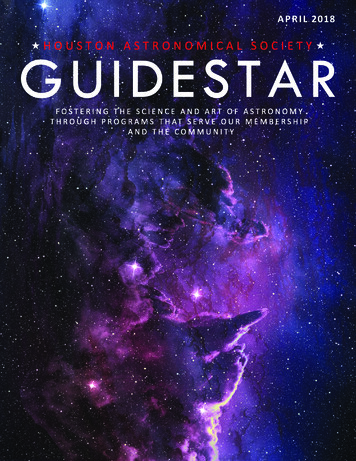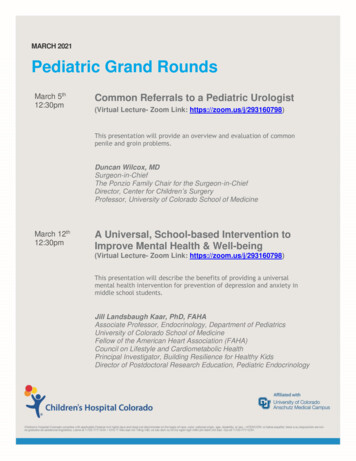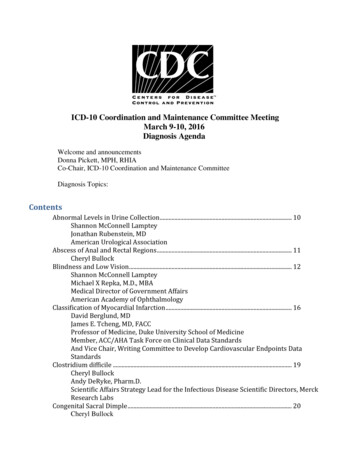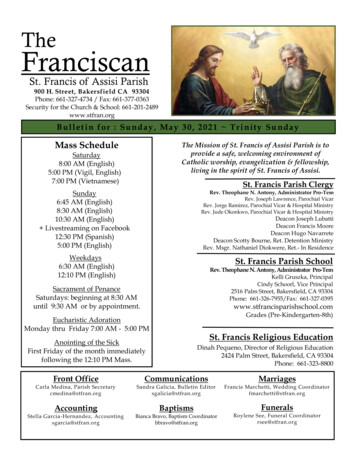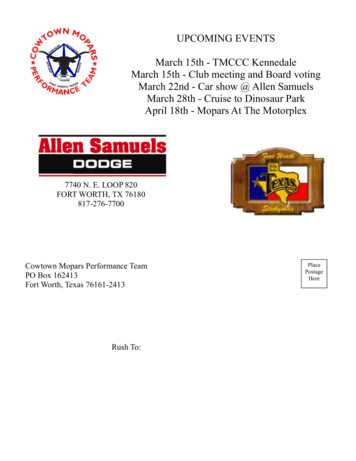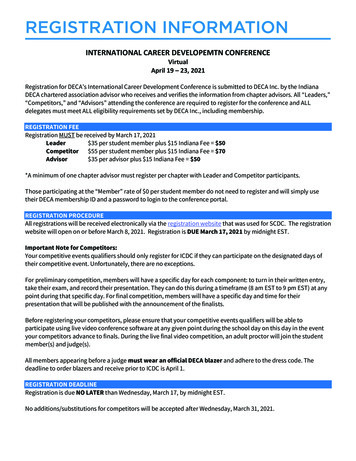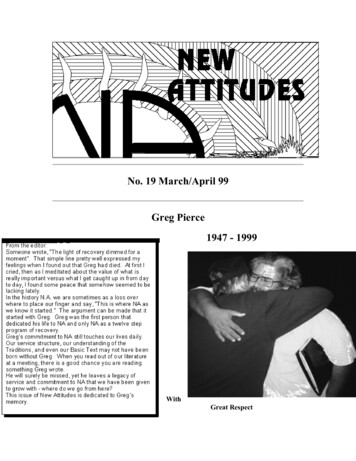
Transcription
No. 19 March/April 99Greg Pierce1947 - 1999WithGreat Respect
Dear Friends, I am a grateful recovering addict named .In February my Dad passed away after a six-month ordealwith both pancreatic and liver cancers. I was sad, but in away I was also relieved for him, that his long suffering wasover.into.Only a matter of weeks later, I heard that my sponsor, GregPierce, had also been diagnosed with liver cancer. Once I gotover the initial shock, I called him, offered my love andsupport, and prepared a package of alternate healinginformation and nutrients for him, which he promised to lookLast Thursday morning, I got a phone call from my friend Jack.He said that sadly, Greg had died suddenly that morning. The disease had progressedwith incredible swiftness, causing his internal organs to fail. I was stunned, though in anodd way, not surprised. And having been through my father's painful last six months, Iwas once again, in a way, relieved that Greg had not had to endure that long ordeal ofsuffering.I found myself feeling a mixture of sadness, appreciation, love and regret. I regretted nothaving called Greg more frequently; but of course how could I know that he would begone so soon and so suddenly? I regretted not having expressed my love, admiration andgratitude to him more often and more directly. But I think he knew; and I also realizedthat he didn't sponsor me for gratification or recognition, but rather out of love. I havemade peace with the loss of a wonderful man, and I wish to share a few words about him:Greg had about 28 years clean; that's about twice my clean time.It is hard to find many people to say that about in NA. Yet. Greg got clean in LA whenthere was hardly any NA outside Southern California. He found a tiny fellowship; and ashe always said, he "bet his life" on NA. Greg quickly got involved in service; he wrotethe NA Tree, our first service manual; he wrote virtually the entire Traditions chapter inthe Basic Text; and he chaired the first World Service Conference. Greg was also, for atime, the chairman of the World Board of Trustees.Maybe the most significant contribution Greg made was to encourage, shepherd, andperhaps serve as "godfather" to the effort for the writing and development of our BasicText. Had Greg not been there to champion the project, it could not have borne fruit atthat time. (Greg's story appears both in the Little White Book and in the Basic Text book2, Chapter 35: "I Was Different." If you've heard him speak, you'll recognize his story ofshowing up for his first meeting in a 3-piece black suit and tie!) The modesty of the storydoesn't hint at the greater contribution he was making to the Basic Text.
Circumstances brought Greg first to Georgia, then to Tennessee.For some years he was the director of treatment for a juvenile facility for the state ofTennessee, and was much loved and respected for his work. He expressed his love andgratitude for his loyal and loving wife and kids.Through all his journeys and trials, Greg never stopped loving and serving NarcoticsAnonymous, and caring deeply about his fellow addicts. In a fellowship of bright people,he was outstandingly intelligent, yet always down to earth and approachable. He traveledinternationally as one of NA's finest speakers; sponsored 20 addicts; collected an archiveof NA material that may only be rivaled by WSO's collection; and in spite of all theseaccomplishments and the love and admiration of thousands, he remained humble, kindly,God-centered and gentle-natured.Even though NA so often departed from his vision of a fellowship fully guided byspiritual principles, Greg continually offered principle-based rather than personalitybased suggestions and corrections to the problems he saw. He was one of the bestlisteners I ever met. He never sought to control, "rule, censor, decide or dictate." His levelof acceptance, even in the face of a terminal illness, was cool, and sometimes uncanny.Greg P. was one of those rare sponsors: living the program, still in love with NA after allthese years, the kind of man you want to emulate as well as admire. It was an honor toknow him. I will miss him. I am consoled by the knowledge that he is now on an evenbetter journey. I wish him well "in his new edition, with a brand new binding, and a veryencouraging Foreword by the Author!"This Newsletter is being provided to any and all interested members of N.A. at COSTplease feel free to copy and give out as many of these as you like. We will be printing bimonthly. Our cost is 0.69 (includes postage) each so 1 yr, subscription would be 4.14(.69x6)Please send articles and newsletter money to:New AttitudesP O Box 447Vestaburg MI 48891please make checks payable to:New Attitudes/I Can't We Can
e-mail: frbeetz@nethawk.comP.S. We also deal in the barter system if you would like to send supplies instead of , weneed stamps, paper (#20 8 ½ x11), ink cartridges for Lexmark WinWriter 150C.Grizzly BearTears do not come easily nor very often for me. Well, they are here now! Thepassing of Greg Pierce is a loss to both N.A. and myself personally. For over tenyears Greg has been my Sponsor, Confidant, Guide and Spiritual Mentor. Withfew exceptions, every Monday night I would call and "check-in with Spons." Thiswas my commitment to an active sponsor/sponsee relationship. With each call Imade written notes and today I am looking at a pile of pads and journal bookswith entries dating back to October, 1988. Now he won't be there.When I asked Greg to be my sponsor I was mostly unaware of Greg's extensivecontributions to Narcotics Anonymous. What I knew is that Greg was like theproverbial Eskimo who was often at the events and places my recovery andservice took me. Greg was able to answer my questions and explain things betterthan anyone else. I started calling once in a while and at a WSO workshop inAtlanta formally talked about sponsorship and made it "official". We built ourrelationship on trust and understanding of spiritual principals. As he showed mehis originals of the N.A. Tree, The Triangle of Self Obsession, Living TheProgram and parts of the Basic Text; I then became familiar with the Greg Pierceothers knew. Anytime Greg came within 200 miles, I would go see him.When he was a Trustee, the BOT met every other month, mostly in Van Nuys. Afavorite routine of ours was to have dinner at Hamburger Hamlet/Heaven andenjoy the Lobster Bisque. I remember the night Bob Stone was fired we hadSushi with Stretch (non-addict Trustee). Other visits included excursions tolocations from Greg's childhood in L.A. and sites notable in the early N.A.Fellowship. Greg introduced me to Vedanta and took me to the Ashram in LaCresenta where Jimmy K's. memorial service was held. Other sites includedJimmy K's house, the 1953 Dad's Club property where the first stand alonemeeting was established, the house where the original NA committee formed, theoriginal Survivor's Club, the Moorpark meeting place, Greg's original homegroupon Gower in Hollywood and others. Copies of Greg's extensive NA archivematerial have graced mine and many others NA history workshops.One time Greg visited my home when I lived in Oceanside and we visited thewidow of his first sponsor, Don Z. Another time, Greg stayed at my place in SanDiego and spoke at the Baja California Convention. My visits to Greg's abodes
included the apartment in Atlanta and the house in the cowfield in Greeneville,Tenn. One of my favorite photos of Greg was taken in Atlanta around 1990.Sitting in his Rover, smiling out the side window -- he looks just like a grizzlybear, and that became my nickname for him. In the near future I'll be seeingAcorn Hill where he was hoping to build a new chapter in his saga. Gregcollected rocks and it always amazed me how he would pack-up and setup themany glass cabinets with his extensive collection. The last time I saw Greg inperson was at WCNA-26 in Saint Louis. Greg and Lois shared a hotel suite withme and my (now) ex. I was glad for the private time with him then since it was thelast time we hugged.When I spoke with Greg four days ago (Monday 26 Apr. '99) he sounded like hebelieved he had weathered the storm and was past the worst of it. Last nightwhen I spoke with Lois, his loving wife, things had changed dramatically. Part ofme is grateful that Greg was not in a lot of physical pain, the other part of meinsists that it was not Greg's time yet. Talk about bewildered, confused and notknowing what to do!Yes I accept God's will, though understanding takes me a lot longer.This was neither a case of casualty nor random accident. To his credit, Greg hadcalmed earlier fears and was truly looking forward to a new era of creativity andfulfillment of dreams. This will take a while to sort out and in my heart, I know itshould be Greg doing the sorting, not anyone else.Very rarely has one person touched and inspired the lives of so many people. Myrecovery and my daily living owe much to Greg. For many of us, Greg is a trueHero of N.A. My guiding light has now become an angel. Best wishes. Farewell. IWILL MISS HIM.Greg Pierce's Last TalkApril 17, 1999Winston-Salem, North Carolina"My name's Greg and I'm an addict. We all going around, around, around and around? chuckles " (talking about cassette recorders)
"Well alright. Umm, I'm real glad to be here to help you celebrate your anniversary, and I'm tickledto death that we have so many new members, Because I very strongly believe that the newcomeris the lifeblood of this institution, the lifeblood of this thing we call Narcotics Anonymous. Thelifeblood of this society, whatever you want to call it. Umm, for those of you who are new, you canprobably discount about ninety percent of what you learn. I believe that recovery over a period oftime is a process of simplification. We learn a lot of stuff about recovery, you'll come in here, andyou'll do worksheets, you'll read books, you'll talk to this person, you'll talk to that person, you'llget sponsors, if you can stick with the basics you have a chance. It's real easy to get lost in allthe. the gimmicks. We have a brand new set of wonderful step writing guides- but you can workthem diligently, and they won't help you stay clean. We have a Basic Text-you can read it everyday, and it won't help you stay clean. We have a book called It Works How and Why that givesyou lots of information about the steps, and the traditions. You can learn it perfect, and it won'thelp you stay clean. It's what you do with that information. It's the way you take that informationfrom all sources and apply it to your daily living and use it to find this thing called recovery. Andrecovery's a very precious gift.Umm, this is liable to be an interesting talk tonight. Umm, because in the last couple of months Ifound out that I have cancer of the liver and uh, I don't feel real good, but you see I'm an NAmember and the day I found out I had cancer of the liver, I called my sponsor and went to ameeting. That's what NA members do! That's part of how this program works. We don't isolate.We don't hide. We don't disappear into the woodwork when things get tough. We reach out to thefellowship. We reach out to our sponsors, we reach out to our meetings, we reach out to thosearound us that we've come to learn to love and depend on. Umm, that's a big part about how thisworks. This is a place where we take turns saving each other's lives. And you know, the peoplethat come after you that you meet in recovery-treat them real well, cause you never know whenyour life's gonna depend on 'em. And you'll meet people that come after you-even though therewere it seems like a whole bunch of brand new people here-stay clean . hang around-givethis thing a chance-keep the faith. There's something very special happening here.You know some of you who introduced themselves as being new have probably been herebefore. Some of you have probably never been here before. Ah. give yourself a break. Try thisway of living- what have you got to lose? If you're like me-you don't have much to lose. If you'relike me-you didn't get here 'cause things were going good in your life. Those of you who are herefor your first meetings-you know-I know where you lived-it's called Hell. 'Cause that's where NAis-go to Hell, and turn left. That's NA. You're not here because you're good at holdin' down a job.You're not here because you're good at stayin' out of trouble, you're not here because you havesuccessful relationships. You're not here uh, because you're uh, you know the candidate forposter child of mental health. You're here for the same reason that I'm here. You're here becauseyou're none of those things. You're here because you're in a trap that you can't get out of byyourself. And despite all the things you've tried, you're still in that trap. In other words, Indesperation, we sought help from each other in Narcotics Anonymous. In desperation we soughthelp from each other in Narcotics Anonymous. And it doesn't make any sense. Doesn't makesense that we can get together, a bunch of losers, and anybody'd stay clean. But we do.You know I've seen NA grow from 20 meetings to 40,000 meetings. I don't even know how manythere are now-that's a guess-maybe more than that. I've seen NA meetings grow from perhaps uh150-200 people attending, and maybe a quarter that many involved, uh, to look around the roomthere's as many people here tonight as were in NA when I got clean. And here we're in WinstonSalem, North Carolina of all places. The birthday of a group-all together. You know what-there'sanother meeting in Bombay isn't there. And there's one in Denmark-I had the opportunity tospeak not too long ago in Denmark. There were 900 NA members from Denmark there. 900!Members from Denmark!! You know I didn't know when we had one from Arizona, or one fromCarolina, or one from New Jersey. There were times when there weren't any anywhere. Umm, wegot people staying clean living this way of life all over the country. And there's power here-there's
miracles here-there's magic here, if you will. But it isn't going to work unless you let go, and let itwork.One of the things I've learned over the last Twenty- eight years is there is no substitute forsurrender. If you want this thing to work-you're going to have to give up. You're going to have togive up being a dope fiend, you're going to have to let. give up you know being hip slick and cool.You're going to have to give up standing on the corner. You're going to have to give up all thosethings that sometimes seem so attractive when you're not hurtin' too bad. And reach out for help.First of all to an NA member, second of all to a loving God. There is no substitute for surrender.There is no therapist that you can go to that's gonna make everything OK. There is no church youcan go to that's going to fix your addiction. There is no book with all the magic answers in it.There is no medicine that'll take care of your addiction.When I say my names Greg and I'm an addict it means three things and they're very simple.Number one when I put drugs in my body, I lose the ability to control how they react in my body. Ilose the ability to predict where they're going totake me. Number two I have a tendency to get strung out on anything. I'll take wonderful thingsand make them self-destructive. You know-its reading-I got a book- I didn't read it much on theway down-'Cause I wasn't feeling all that well I was catnapping in the car most of the way. I loveto read! I didn't read before I got clean. But I've learned it's a great escape. But you know what? IfI pick up a book and get into it, I may. might have to finish it before I set it down. Now I might beable to set it down, in the meantime, but I have no way to determine that. I'll get strung out on allkinds of weird stuff. And thirdly, when I say that I'm an addict it means that I carry this spiritualillness that separates me from you. Separates me from every other human being. It separates mefrom God, it separates me from life and reality.And uh, that's difficult. You know we know what it'slike to be alone. One of the things I remember before coming to NA was the loneliness ofaddiction. The loneliness-even when you're in a room full of people. And some of you sitting heretonight, in a room full of people, are about as lonely as you can stand. Nobody knows it, causeyou haven't let anybody in- cause you're afraid. Cause of all these things.I came around the program-Now I did what pretty much what we do-I mean there aren't a lot ofdifferent ways, we think we got some unique handle on how we do this program, but there's not.And I come around here and the first thing that happens is I start going to meetings and I stopusing and you know it's kinda like I start getting high offa not being high. It's almost like not usingnothing's a new drug. And then after a while I'm going to these meetings, and I'm listening to whatpeople are reading and all this stuff-You know I kinda memorized that stuff. Couldn't read verywell. And I know people who've come around to NA without being able to read at all, who learn toread by listening to the readings in the meetings. Again and again and again and again andhearing them, and seeing them at the same time. If you have a problem with reading, get yourselfa little white booklet, and as the readings are being read, follow along with it. And that can teachyou how to read. It's taught a many, many people how to read. Um, you don't have to talk toanybody about having a reading problem-lot of us have reading problems. But read along-learnthe words.And at ninety days, I had all the answers. I had 'em all! I had this shit down. I'd tell ya-ask me anyquestions-ask me a question-just go ahead. I'll tell ya. And I'd spout this stuff about the"Therapeutic value of one addict helping another is without parallel. I didn't have any idea aboutwhat I was talking about. Or I'd say something like, "there's one thing more than anything elsethat will defeat us in our recovery, this is an attitude of indifference or intolerance toward spiritualprinciples." Do you think at ninety days I had any idea what that meant? It sounded good-youknow-it made me feel like part of-and people would accept me-they'd pat me on the back sayingOh you're doing good-but the reality is I didn't know-I didn't have a clue-I just memorized thewords! And I thought I had all the answers-you know the funny part about it is I did have all the
answers-I just didn't know which were which-and which went with the which questions. You knowor what they meant or how I could use them in my daily living- that's the biggie.Our twelfth step says, "Having had a spiritual awakening as a result of the these steps, we tried tocarry this message to addicts and practice these principles in all our affairs." And I'm big intopractice these principles in all our affairs. You know once you find out about how this programworks, start using it in your life! In every area of your life. You know, don't withhold anything. Don'treserve anything. You know reservations are the kind of the things I told God "Hey God I'll handlethis one, you just leave me alone. I can take care of it, I can handle it." And I'm in trouble. Cause Ican no more handle my life than the man in the moon. You know, if I could handle my life, I surewouldn't end up sitting up here in front of you guys with cancer-I'd be bouncing around the roomyou know-finger poppin' talking long shit. But I'm here tonight because I'm an NA member. I'mhere tonight because this is part of how I live. This is as much about a part of the way I live as uh,turning my will and my life over to the care of God. Or writing an inventory, or making amends orany of the other things the program teaches me to work.Over the years, Our programs change, you know I got to that point where I was talking aboutknowing all the answers-and that only lasted about a month before the roof caved in. You knowthe big blue bird of feelings flew over and took a healthy dump and I figured out oh this is why Iused. And I had no way to cope with those feelings-I had no way to cope. And what'd I do? Iturned to the program. And I can remember at six months going Oh my God it's not the drugs.Cause I thought drugs were the problem. I really thought the drugs were the problem. And hadyou asked me I would've told you I was powerless over heroin and it had fucked up my life. Andthat's what the first step said. But that's not what the first step says. The first step says we'repowerless over our addiction, that our lives had become unmanageable.And again addiction is a three fold disease-it's physical, and that has to do with the drugs that weused, but its also mental and spiritual. And my experience is the mental part and the spiritual partare much more devastating and much more far reaching than the physical part of our disease.Now once we clean up and kick a habit, the physical has pretty much taken care of itself. Themental and spiritual aspects of our disease continue throughout our recovery. The potential forthe physical continues on for our recovery. But in reality the mental and spiritual aspects arethings that you'll have to deal with all your life. And again the tendency we have to get strung outon anything, take wonderful things and make them self-destructive.And number two, lack of faith, lack of hope, lack of trust, inability to not sure , self obsession,low self-esteem. Those things are things that we have to cope with on through time, and thingsthat I have to struggle with today. The most difficult thing in my life today is the third step. Themost difficult thing in my life today is the third step. To really make that decision to turn my willand my life over to the care of God as I understand him.As I continued, and approached a year I got into the what they call the birthday crazies, wherejust before a year where, where, you're into sabotage, you know? Oh my God I'm a sick mananother three weeks I'll have a year and I'll have made it, what'll I do now? How can I, how can Iwreck this? Or just after a year when you're going, whew boy I'm glad Imade that, now I can get back to looking like a real person. The reality is that I've been lookinglike a real person. You know, or the step that happens at eighteen months, when we findourselves bored with the program and it says it in the white booklet we get tired of repeating ournew practices or that, uh, that sometimes in those times are when the greatest changes takeplace within.Um, I'd get tired of this. I you know, I'd discovered that there were other things to do other than goto meetings. I mean, I found Star Trek on the TV, I found books, I found hobbies, I found things I
enjoyed doing, I thought, I found things that were fun. Certainly not a whole lot more, certainly awhole lot more fun than listening to you guys. You know we come in here, you know meetingsdon't change too much, from day to day, year to year, you know every once in a while there'ssomething spectacular that happens, but basically year in year out, people say pretty much thesame things. Newcomers ask the same questions, people's responses to those questions arepretty much the same, you know, uh, and it's not a thrilling existence, it's not, you know thethrilling part comes in watching someone's eyes, the thrilling part comes when you're talking withsomeone after a meeting, and you can see a change take place. See someone begin to live,where once they were dying. That's the thrilling part. The thrilling part's at a convention, uh whenyou finally, something clicks. You're going Oh WOW now I understand that! Or at someone'shouse, becoming a part of someone's life. Those are the thrills of Narcotics Anonymous.You know, NA to me is not about an hour, an hour and a half in the evening. An hour, an hourand a half in the evening are fine, but NA's so much more than that. It's a way of living. You eitherlive this way or you don't live this way-it's ok if you don't. It's ok if you don't. Ah, I've had to givepeople permission to reject this way of life. Because, uh, you know the reality is that some do,and it hurts when you care a lot about 'em.We're not in recovery in isolation, we affect each other's lives. And when someone you've caredabout, and you've spent time with, and you've invested your spirit with, goes out, it hurts. I canremember saying um, God, -please don't let me love another addict, cause it hurts too bad whenthey leave. And you know what-that isn't the answer either. That was too much like the death Ihad using, not being able to care about anybody.At three years I found myself in a situation where uh it seemed like all the things I'd used to try tofix myself quit working, substitution quit working. And uh, I was in trouble, and I had to dive intothe program on a new level. At four and a half years it seemed like the program quit working. Thethings you taught me about NA, um the gimmicks; the write the inventory, the call your sponsors,the work with your newcomer, all those things seemed to quit working. And I had to get right withmy Higher Power, I had to come out with a new relationship with God. I had to turn my recoveryover to the care of God as I understood him. I couldn't just turn the symptoms over. I had to turnthe real deal over. I had to work the third step for the first time. For real. My understanding of thesteps has changed over time. You know like I told you about the first step, I originally thought thatmeant, that that you know that I admit that I am powerless over heroin, that it had screwed up mylife- that was obvious. But um I've come to believe in this three fold disease.Perhaps the most change has come in the second step. Particularly in the last few years. Wecame to believe that a power greater than ourselves could restore us to sanity. And I thoughtoriginally that meant I'd come to believe that God could fix me. You know maybe God can fix me.But I don't think that's what the step says. I had to look at this idea sanity and what did that reallymean. And I went back to the simple stuff-a person who is sane is a person who is in touch withreality. A person who is insane is someone who is out of touch with reality. And what's reality,ultimately reality is God-the universe, all things. So, my second step changed to where I come tobelieve that a process-these twelve steps-can put me back in touch with reality, can restore myspirituality, and restore my relationship with God. And that's really changed all the rest of thesteps.I used to think the third step was about making a commitment, and saying the words-they had athird step prayer I used to repeat. It was a really good prayer. Um today, my third step is abouttrying to live life, as if I really believed there was a loving God trying to take care of me. I mean,what if there really was!? What if there really is someone taking care of you? And it's ok to riskliving. What if there really is a loving god out there working for you and you don't have to try tocontrol all this shit? And you don't have to try to make the unmanageable turn out the way youwant it. What if? It'd be a different world, wouldn't it? I know it's been a different world for mewhen I can believe that.
The fourth step instead of being show and tell you know has been a matter of really taking a lookat who I am, and seeing the ways that I've separated myself from God. You see and those thingsthat I've done throughout my recovery that keep me from growing spiritually-the patterns I'vefallen into, the mistakes I've made, and even some of the successes, which have kept me fromsurrendering. You see if you give me a quarter inch of success, I'll ride it for a mile and a half. I tryone thing, and it turns out OK, I'm going to try it a hundred times, just to try to make it come outOK again. Except I forget the first time it turned out OK it wasn't because of my doing, it wasGod's doing. I forget that. So my fourth step has become an exploration of me, and how I relate toGod. It's become a lot about humility. You know we talk a lot about humility in the later steps, butthere's a lot of humility in the fourth step, knowing who and what you really are. Only by knowingmy patterns can I avoid them.In the fifth step, to me it's become a time when I can gain some clarity about that. Get someonesitting down with me who doesn't have a big interest in who I am. You see, I am incapable ofbeing objective about myself. Everything I think about me is tied up in my hopes, my prayers, myfears, my shit, my issues, my past, my present, my dreams, and you know, I'll tweak anything.Lois brought home a thing one time from a meeting saying "we're the kind of people who from asingletree can create a mighty forest in which we immediately get lost." It's True! That's the kind of stuffI need a sponsor for. He can say "hey dummy this is just a tree!" This ain't the world!Who is not prejudiced about Greg. Who can see me objectively and say "hey-this pattern heredon't you see this?" and I go "no." And uh, that's what my fifth step has turned into. Getting someperspective on what I learned in the fourth step. Getting some unprejudiced, outside opinionabout what's going on. what's really going on in my life.The sixth step; becoming entirely ready to have God remove all these defects of character, to meis about getting ready. It's about learning about those defects, and taking the step I learned aboutin the fourth and fifth step, and really taking a look at it. Why is this a defect? What does thismean? What is it all about? It's about learning more about humility and it's also about preparing todo the seventh step. One of the things that has been very. become a big favorite of mine in thesixth step when I'm working with someone is asking the person I'm working with is to write theirown personal individual unique seventh step prayer. And something that means what they reallywant it to m
recovery and my daily living owe much to Greg. For many of us, Greg is a true Hero of N.A. My guiding light has now become an angel. Best wishes. Farewell. I WILL MISS HIM. Greg Pierce's Last Talk. April 17, 1999. Winston-Salem, North Carolina "My name's Greg and I'm an addict. We all going around, around, around and around?

